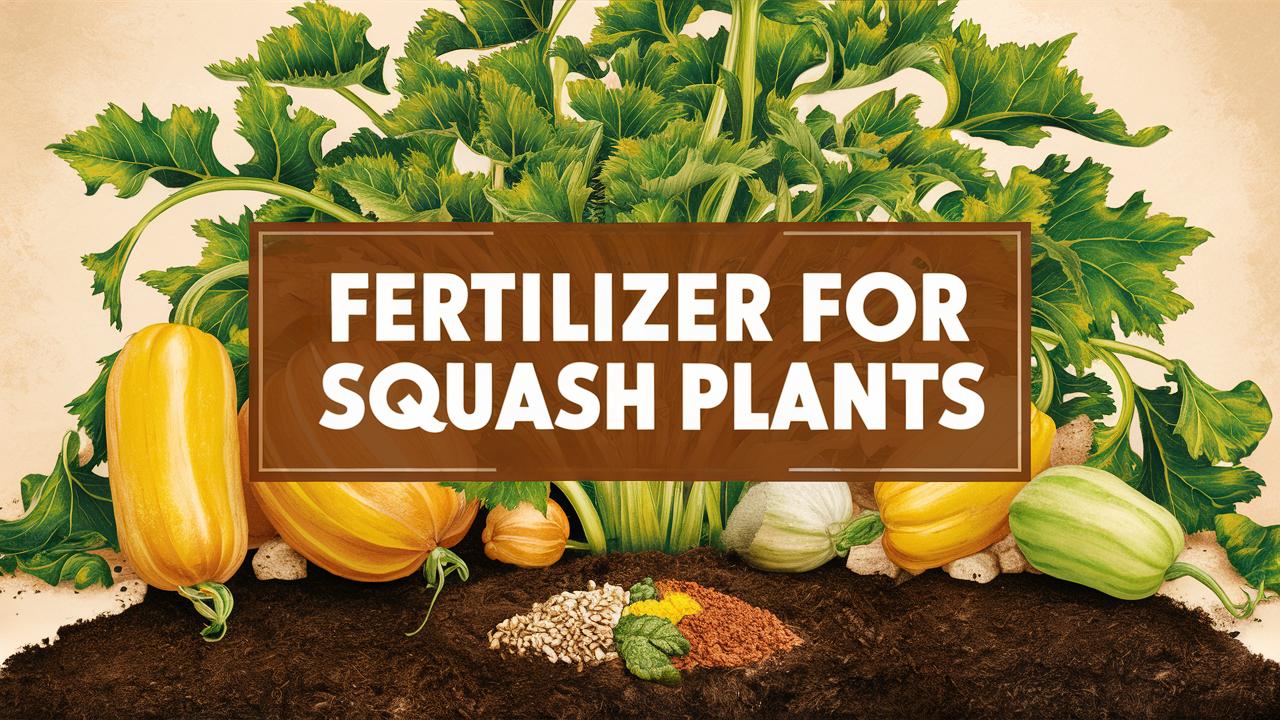This guide will cover the various aspects of fertilizing squash plants, which will help you make informed decisions for your garden this season.
Fertilizer For Squash Plants
| Image | Name | Rating | Shop |
|---|---|---|---|
 | Plant Magic GroBoost |  | |
 | Burpee Blood Meal |  | |
 | Organic Grower’s Delight |  |
Plant Magic GroBoost
For squash plants, we recommend Organic Plant Magic – Truly Organic™ Fast-Acting Water Soluble Plant Food. This all-purpose fertilizer concentrate is perfect for promoting healthy growth and development in your squash plants.
This product is easy to use and can be added directly to the soil or mixed with water for a quick boost of nutrients. A 1/2 lb bag makes over 32 gallons, making it a great value for covering large areas of soil or treating multiple plants. With its unique blend of essential plant nutrients, trace minerals, and beneficial microorganisms, Organic Plant Magic helps to build healthy soil and promotes vibrant growth in squash plants.
Burpee Blood Meal
Burpee Organic Blood Meal Fertilizer is a top choice for those looking to promote bountiful growth in their squash plants. As an organic and OMRI Listed fertilizer, it provides an excellent natural source of nitrogen essential for healthy plant development.
This concentrated 12-0-0 formulation supports not only soil health but also discourages animals from feeding on your vegetables and flowers due to its strong smell. With its long history of providing high-quality products and reliable gardening advice since 1876, Burpee is a trusted name in the industry. Use this fertilizer with confidence to ensure a thriving squash plant.
Organic Grower’s Delight
If you’re looking to provide your squash plants with a nutrient-rich fertilizer, consider Dr. Earth Organic 5 Tomato, Vegetable & Herb Fertilizer Poly Bag. This product offers an all-around solution for vegetable gardens, containing optimum levels of primary plant nutrients necessary for healthy growth and development.
This fertilizer is made entirely from organic ingredients, eliminating the use of GMOs, chicken manure, or sewage sludge often found in conventional fertilizers. The addition of pro-biotic soil microbes and mycorrhizae not only promotes beneficial microbial activity but also aids in improving overall soil health, resulting in more abundant squash crops that are both nutritious and delicious.
Garden-tone
For squash plants, we recommend using Espoma’s Garden-Tone 3-4-4 Organic Fertilizer. This fertilizer is specifically designed for use on a variety of vegetables and herbs, including leafy greens and warm season crops like tomatoes, peppers, and melons.
Garden-Tone is a rich blend of natural and organic ingredients that provide essential nutrients to support healthy plant growth. The 3-4-4 fertilizer analysis with added calcium promotes robust root development and vibrant foliage, leading to an abundant harvest of nutritious and flavorful vegetables. With its easy-to-use formula and no-mixing requirement, Garden-Tone is a hassle-free way to keep your squash plants thriving throughout the growing season.
Veggie FeED
Jack’s Classic 12-15-30 Veggie Feed Water-Soluble Fertilizer with Micronutrients is a solid choice for squash plants that offers the right balance of nutrients for healthy plant growth and abundant fruit set.
This fertilizer comes in a convenient water-soluble powder form that can be easily mixed with water to create multiple gallons of liquid fertilizer. It’s great for both root feeding and foliar application, allowing you to address your squash plants’ needs from multiple angles. With its 12-15-30 analysis and added micronutrients, this product should provide your squash plants with the necessary nutrition for optimal growth and health.
Miracle-Gro Shake ‘N Feed
Miracle-Gro Shake ‘N Feed Tomato, Fruit and Vegetable Plant Food is a reliable choice for squash plants as well. It’s designed to feed plants both above and below the soil, promoting healthy growth and fruit development.
The product’s calcium content helps strengthen plant walls, leading to better quality and longer-lasting fruits and vegetables. Simply shake the formula onto the soil, work it into the top 1-3 inches of in-ground plants or lightly mix it with established container plant soil, and water to start feeding. Reapply every three months for optimal results.
Grow Accelerator
This liquid fertilizer is particularly well-suited for stimulating and accelerating growth on squash plants, as part of its benefits include improved yield and accelerated growth. Its unique blend of plant growth stimulants can provide essential nutrients to your squash crop.
With a concentrated formula that allows you to mix 1-2 oz with one gallon of water to cover up to 32 gallons, it’s efficient and effective for large garden areas or commercial use. Additionally, its guaranteed analysis specifies nitrogen, phosphorus, potassium, boron, iron, manganese, and zinc making it suitable for promoting plant health in your vegetables.
Cz Garden 5-10-10
This fertilizer option seems like a decent choice for promoting vigorous growth in squash plants. The 5-10-10 formula suggests it’s a balanced blend of nitrogen (N), phosphorus (P), and potassium (K) with micronutrients to support overall plant health.
If you’re looking for a slow-release fertilizer that won’t burn your squash plants, this Cz Garden product might be worth considering. The resealable packaging makes it easy to use only what’s needed and store the rest for later. And, as an added bonus, it’s made in the USA from high-quality ingredients. Just keep in mind that while it’s labeled as a tomato & vegetable fertilizer, it might still deliver great results for squash plants.
Understanding Squash Nutrition Needs
Before delving into fertilizer selection, it’s important to understand what squash plants need for optimal growth. Squash belongs to the Cucurbita genus and can be categorized into summer and winter types, both of which have similar nutritional requirements. Key nutrients crucial for squash growth include nitrogen (N), phosphorus (P), and potassium (K), often referred to as NPK.
Nitrogen (N): Essential for leaf growth and overall plant health. A nitrogen deficiency can result in yellowing leaves and stunted growth.
Phosphorus (P): Vital for root development and flowering. It supports the establishment of the plant and helps in producing fruit.
Potassium (K): Important for overall plant health, fruit quality, and disease resistance. It improves water retention and enhances the plant’s ability to handle stress.
In addition to these primary nutrients, squash plants benefit from secondary nutrients such as calcium and magnesium, as well as micro-nutrients like iron, manganese, and boron. A well-rounded fertilizer addresses these needs, fostering healthy and prolific plants.
Analyzing Soil Fertility
Choosing the right fertilizer begins with analyzing your soil’s fertility. Testing your soil will provide a snapshot of its nutrient status and pH level, allowing you to tailor your fertilization plan more accurately. Many local extension services offer soil testing for a small fee.
While testing, pay special attention to:
pH Level: Squash prefers slightly acidic to neutral soil, with a pH level between 6.0 and 7.0. If your soil is too acidic or alkaline, it can affect nutrient availability.
Nutrient Levels: Examine the levels of nitrogen, phosphorus, and potassium, along with secondary and micronutrients. This will tell you whether you need to add fertilizers to boost specific nutrients.
After testing your soil, you can determine whether your squash bed needs a general fertilizer, or if a targeted approach is necessary.
Types of Fertilizers: Organic vs. Synthetic
When it comes to selecting fertilizers, you’ll encounter two main categories: organic and synthetic. Both have their pros and cons, and understanding these can guide your decision.
Organic Fertilizers
Organic fertilizers are derived from natural sources such as compost, animal manure, bone meal, or fish emulsion. They generally release nutrients slowly and improve soil structure over time. Benefits include:
Environmental Sustainability: Organic fertilizers support a healthy ecosystem and promote microbiological activity in the soil.
Nutrient Retention: They enhance the soil’s ability to retain moisture and nutrients.
Reduced Chemical Residue: You avoid the risk of chemical runoff into waterways, making it a more environmentally friendly option.
Common organic fertilizers suitable for squash include:
Compost: Enriches the soil with nutrients and beneficial microorganisms.
Fish Emulsion: A popular liquid feed that provides a quick nutrient boost.
Bone Meal: A great source of phosphorus for root development.
Synthetic Fertilizers
Synthetic or chemical fertilizers are manufactured to deliver specific nutrient formulations. They act quickly, making them a popular choice for many gardeners looking for immediate results. Key points to consider include:
Immediate Nutrient Availability: They are readily absorbed by plants, providing quick growth boosts.
Precise Nutrient Ratios: You can choose specific NPK ratios tailored to your plants’ immediate needs.
However, synthetic fertilizers can lead to nutrient leaching and may harm beneficial soil organisms if used excessively. Examples of synthetic fertilizers for squash include balanced fertilizers like 10-10-10 or fertilizers designed specifically for flowering plants, such as 5-10-10 for increased phosphorus.
NPK Ratios: Choosing the Right Fertilization Formula
When selecting a fertilizer, the NPK ratio is one of the most important factors to consider. The numbers represent the percentage of nitrogen, phosphorus, and potassium in the fertilizer. Different growth stages of squash require varying NPK ratios:
For Planting Stage: A fertilizer with a higher phosphorus content (e.g., 5-10-5) promotes strong root development and initial growth.
For Fruiting Stage: Once the plants start to flower and fruit, a balanced fertilizer or one with reduced nitrogen (e.g., 5-10-10) can support fruit production without encouraging excessive leafy growth.
The fertilizer label will typically indicate the NPK ratio, and selecting based on the growth phase can help you optimize nutrient delivery.
Timing Your Fertilization
When you fertilize can be as important as what you fertilize with, particularly for squash. Timing your applications can lead to better nutrient uptake and healthier plants.
Pre-Planting: Before sowing seeds or transplanting seedlings, it’s beneficial to amend your soil with well-aged compost or a slow-release organic fertilizer. This provides a nutrient-rich environment and fosters stronger root development.
At Planting: Adding a balanced fertilizer at the time of planting ensures that nutrients are readily available as the plant establishes itself.
During the Growing Season: As squash plants grow, consider side-dressing with nitrogen-rich compost or organic fertilizers several weeks after planting, especially for vigorous growth. Apply fertilizers during mid-summer for prolonged cropping.
Flowering and Fruiting: During the flowering phase, reduce nitrogen and enhance phosphorus and potassium levels to promote fruit development.
End of Season: It could be beneficial to provide a final round of low-nitrogen fertilization post-harvest to improve soil health for the next growing season.
Application Methods: How to Fertilize
How you apply fertilizer can significantly impact nutrient effectiveness. Here are the most common methods for applying fertilizers to squash:
Granular Fertilizers
Granular fertilizers are spread evenly over the soil surface and then worked into the top few inches of soil. This method allows nutrients to gradually integrate into the soil. It’s typically done before planting or as a side-dressing during the growing season.
Tips for Granular Fertilizers
Follow package instructions for application rates.
Water after application to help dissolve the nutrients and carry them to the root zone.
Liquid Fertilizers
Liquid fertilizers can be applied directly to the soil or as a foliar spray. This method ensures that nutrients are quickly absorbed by the plants.
Tips for Liquid Fertilizers
Dilute according to the manufacturer’s instructions.
Apply during the early morning or late afternoon to reduce evaporation and enhance absorption.
Fertigation
For those with irrigation systems, fertigation combines fertilization and irrigation, providing a steady supply of nutrients directly to the root zone. This method is efficient for achieving optimal nutrient uptake.
Tips for Fertigation
Use water-soluble fertilizers designed for fertigation.
Run the irrigation system afterward to flush any remaining nutrients into the soil.
Signs of Nutrient Deficiencies
Even with proper fertilization, squash plants might still exhibit signs of nutrient deficiencies. Being able to identify these will allow for timely corrective actions.
Nitrogen Deficiency: Yellowing of older leaves, stunted growth, and overall paleness in color.
Phosphorus Deficiency: Dark green or purplish leaves, reduced flowering and poor fruit development.
Potassium Deficiency: Browning edges of leaves, poor fruit quality, and a general drop in vitality.
Pay attention to your plants as they grow. Regular observation can help you adjust your fertilization plan quickly if deficiencies arise.
Environmental Considerations
When choosing fertilizer for your squash plants, consider the broader environmental impact. Over-fertilization can lead to nutrient runoff, harming local waterways and wildlife. To reduce these concerns:
Implement a soil conservation plan, such as cover cropping.
Utilize organic fertilizers when possible to improve soil health without the risk of leaching.
Monitor weather patterns after fertilization; avoid applying fertilizers before heavy rainstorms.
Conclusion
Choosing the right fertilizer for squash plants involves understanding their nutritional needs, analyzing soil conditions, and applying the right formulations at the right times. Whether you opt for organic or synthetic options, your ultimate goal should be to enhance growth, flavor, and yield while maintaining soil health.










